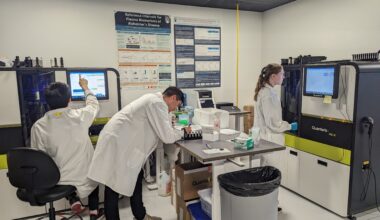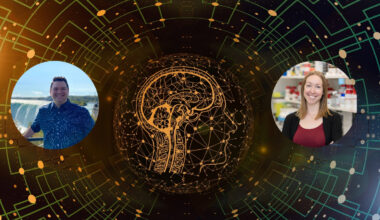Ellen Koch is a PhD student in Dr. Lynn Raymond’s lab, who just recently successfully defended her thesis. We caught up with Ellen to learn more about her latest research and her hobbies outside of the lab.
 Why did you decide to pursue a PhD in neuroscience?
Why did you decide to pursue a PhD in neuroscience?
I have always been fascinated by the brain, and how it is able to control so many diverse and complex behaviours in humans and animals. Our brains are what make us who we are, and allow us to interact with the world around us, and the impact of disorders of the nervous system can be devastating. Neuroscience is a relatively new science, and there is still so much that we need to learn about how the brain works in health and disease. Therefore, I wanted to be a part of building on our collective knowledge of the brain and nervous system, and to contribute to research that could lead to treatments for neurological disorders.
You are the first author of a new paper just published in the journal Movement Disorders. What is the main focus of the paper and what did you find?
The main focus of this research paper is understanding how brain activity is altered during behavioural tasks in Huntington disease model mice. In Huntington disease, individuals suffer from motor, cognitive and psychiatric impairments, and the genetic mouse models that we use also exhibit similar symptoms. However, very few researchers have measured brain activity at the same time as behaviour in these mice. Therefore, this research provides one of the first glimpses at how changes in the brain directly relate to behavioural changes in Huntington disease mice. We measured brain activity of a region called the striatum, which is a part of the brain that coordinates movement and is highly degenerated in Huntington disease. We found changes to the activity of this brain region while mice performed a motor learning task called the accelerating rotarod, which shows that changes to brain activity could be contributing to the difficulties these mice have with the task.
Another interesting finding that comes from this work relates to our behavioural analysis. Using machine learning software, we were able to complete detailed measurements of the mouse’s paw position during the rotarod task, revealing subtle deficits in the ways the Huntington disease mice move their paws. This analysis revealed new deficits previously unknown to the field in Huntington disease mice, beginning at very early disease stages when pharmaceutical intervention would be ideal.
What is the significance of this research? Why is preclinical research important?
This research marks the first article to record activity in the striatum during the accelerating rotarod task in Huntington disease mice. The rotarod task is commonly used in Huntington disease research to characterize behavioural deficits and to test therapeutic interventions on behaviour. By measuring brain activity at the same time, we now have shown ways in which activity of the striatum is altered during this task in Huntington disease mice, confirming that the function of the striatum is impaired. By also analyzing paw kinematics, we have revealed more detailed ways in which motor coordination and learning are impaired in these mice.
Preclinical research is a powerful tool to study the neurological mechanisms behind diseases, and to test the safety and efficacy of potential therapeutic interventions before we can use them in humans. We think that our results provide a platform to test the efficacy of therapeutic interventions to treat Huntington disease on both behaviour and the underlying brain activity.
What is an important lesson you learned during your PhD?
I think that one important lesson that my PhD has taught me is that nothing can ever be “perfect” and trying to plan out the perfect PhD degree is probably not a valuable use of your time. Mistakes will be made, things won’t go as planned in your experiments, or your results might be completely different than you expected. A large part of your PhD experience is learning to face the unexpected twists and turns and be able to form new questions and new ideas as you move forward. Sometimes it can feel discouraging, but it is part of the process and doesn’t make you any worse of a researcher – if anything, the unexpected results and failures are what train you to be an even better scientist.
What are your plans after completing your degree?
After completing my degree, I plan to continue research in the field of motor learning in health and disease. I’m currently on the market for post-doctoral opportunities to study motor learning in humans and animal models and how this is affected by various disorders.
What are some things you enjoy doing outside of the lab?
I am a huge pet lover and have a dog and two cats, so outside of the lab you will find me hanging out at home with my cats, or taking my dog out for a hike on a trail or the dog park. I also have been teaching yoga for almost 10 years, and regularly teach at UBC as part of the UBC Yoga Club!


